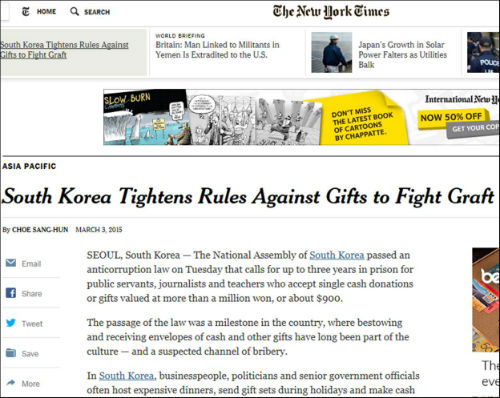‘벤츠 검사’ 거론.. “강력한 반부패법에 대한 요구 韓서 지지받아”
미국 <뉴욕타임스>가 한국에서 ‘김영란법’이 통과된 것을 주요 뉴스로 전했다.
외신 전문번역 매체 <뉴스프로>에 따르면, <NYT>는 3일 「한국, 뇌물수수 방지 위해 선물제한법 통과」라는 제목의 기사를 통해 반부패법이 통과되었음을 보도했다.
<NYT>는 “한국 국회는 언론인, 교사 그리고 공직자가 백만 원 혹은 910달러 이상의 현금 혹은 이에 해당하는 선물을 받을 경우 최고 3년형을 선고받게 하는 반부패법을 통과시켰다”며 “이 법의 통과는 현금봉투와 기타 선물 등을 주고받는 것이 오랫동안 문화의 일부가 되어왔고 뇌물의 통로로 의심받아온 한국에서 획기적인 사건”이라고 전했다.

신문은 지금까지 한국 법원에서 특별한 대가성이 인정되는 선물이나 접대에 한정해서 처벌을 받았다고 설명하며 ‘벤츠검사’등 스폰서들로부터 선물을 받고도 뇌물의 증거가 없어 처벌받지 않은 사례들이 있었다고 지적했다.
<NYT>는 세월호 사건을 언급, “선박침몰을 막지 못하는 데 정부 규제관들의 부패가 주요 원인으로 드러난 이후 반부패법을 마련하도록 정치권에 대한 압력이 거세졌다”며 “국회의원들은 언론인과 교사들에게도 공무원과 똑같이 부패법이 적용되도록 결정했다”고 전했다.
또한 신문은 기사 말미에 “국제 투명성 기구가 작성한 2014년 부패 인식 지수에서 한국은 175개의 조사 대상국 중 43위를 차지했다”고 덧붙였다. (☞ ‘뉴욕타임스’ 원문 기사 보러가기)
| 다음은 <뉴스프로>의 ‘뉴욕타임스’ 기사 번역 전문 South Korea, Seeking to Curb Graft, Passes Law Restricting Gifts By CHOE SANG-HUNMARCH 3, 2015 SEOUL, South Korea — The National Assembly of South Korea passed an anticorruption law on Tuesday that calls for up to three years in prison for journalists, teachers and public servants who accept single cash donations or gifts valued at more than a million won, or about $910. Passage of the law signaled a milestone in the country, where bestowing and receiving envelopes of cash and other gifts have long been part of the culture — and a suspected channel of bribery. In South Korea, businesspeople, politicians and senior government officials often host expensive dinners, send gift sets during holidays and make cash donations at weddings and funerals, making it difficult to determine what amounts to corruption and what should be accepted as part of social etiquette. Until now, people have been punished for graft only when it was established in court that they had accepted a gift in return for doing a specific favor, like helping the gift-giver obtain a government license or school admission. Such a stringent legal requirement has raised concerns that much of the corruption in the country has gone unpunished, especially the so-called sponsorship relationships that some businesspeople and politicians were said to maintain with prosecutors, government officials and journalists. Under that arrangement, the “sponsors” would wine and dine the recipients, as well as provide them with financial support, not necessarily for any immediate favor but for long-term collusive ties. Under the new law, which is to take effect in October 2016, public servants, teachers and journalists will face fines or prison terms of up to three years for taking such gifts exceeding about $910, regardless of whether there is evidence of bribery or influence-peddling. They will face similar punishment if their spouses receive such gifts from people that involve conflicts of interest. (Those who report their spouse’s gifts to the authorities will be exempt.) Those who receive gifts valued at less than the designated amount may be fined if those gifts involve a conflict of interest. The government said it was working to assemble a list of gifts that would be exempt from the new law, such as small cash donations at the weddings and funerals of friends and relatives. Demands for a tougher anticorruption law have gained support in South Korea in recent years after prosecutors who received a Mercedes-Benz or other gifts from their sponsors went unpunished because there was no proof of bribery. Pressure on political parties to come up with the law mounted after it was revealed that corruption among government regulators played a central role in failing to prevent the sinking of a ferry that killed more than 300 people, mostly teenage students, in April. Lawmakers subsequently decided that journalists and schoolteachers should be subject to the same anticorruption rules as public servants. In the 2014 Corruption Perception Index compiled by Transparency International, South Korea ranked 43rd among the 175 countries surveyed. |


